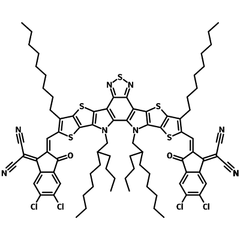BTP-eC9, Y series n-type non-fullerene acceptor with NIR absorption
Available to buy online or request a quote today and enjoy discounts on large quantities
BTP-eC9 (CAS number 2598965-39-8) is a family member of the Y series of n-type non-fullerene semiconducting acceptors. It has been proven that these NFAs can achieve high device performance in non-fullerene polymer solar cells (NF-PSCs).
With a fused thienothienopyrrolo-thienothienoindole (TTP-TTI) core, BTP-eC9 is a modified version of Y7 but with better solubility. Comparing to Y6, chlorination at the peripheral end-groups can efficiently lower HOMO/LUMO energy levels. C–Cl bond also has a large dipole moment, expanding the absorption range further to near infrared (NIR) region.
High efficient non-flullerene acceptor
With highly conjugated core
Expanded absorption range
large dipole moment induced by chloride substituents
Worldwide shipping
Quick and reliable shipping
Green energy materials
Processable in non-halogenated solvents
A device efficiency approaching 18% has been reported using BTP-eC9 as the electron acceptor and PBDB-T-2F (PM6) as electron donor in single junction organic photovoltaic cells.
Device structure: ITO/PEDOT:PSS/PBDB-T-2F:BTP-eC9 (1:1.2)/PFN-Br/Al
| Thickness (nm) | VOC (V) | JSC (mA cm-2) | FF (%) | PCE (%) |
| 100 | 0.839 | 26.2 | 81.1 | 17.8 |
General Information
| CAS Number | 2598965-39-8 |
| Chemical Formula | C86H94Cl4N8O2S5 |
| Full Name | 2,2'- [[12,13-Bis(2-butyloctyl)-12,13-dihydro-3,9-dinonylbisthieno[2'',3'':4',5']thieno[2',3':4,5]pyrrolo[3,2-e:2',3'-g][2,1,3]benzothiadiazole-2,10-diyl]bis[methylidyne(5,6-chloro-3-oxo-1H-indene-2,1(3H)-diylidene) ]]bis[propanedinitrile] |
| Molecular Weight | 1573.89 g/mol |
| HOMO / LUMO | HOMO = -5.64 eV, LUMO = -4.05 eV [1] |
| Solubility | Chloroform, chlorobenzene and dichlorobenzene |
| Form | Dark blue powder/crystal |
| Synonyms | eC9, BTP-eC9 |
| Classification / Family | BTP series NFAs, n-type non-fullerene electron acceptors, Organic semiconducting materials, Low band-gap small molecule, Small molecular acceptor, Organic photovoltaics, Polymer solar cells, NF-PSCs. |
Chemical Structure

MSDS Documentation
Pricing
| Batch | Quantity | Price |
| M2249A1 | 100 mg | £360 |
| M2249A1 | 250 mg | £720 |
| M2249A1 | 500 mg | £1250 |
| M2249A1 | 1 g | £2300 |
| M2249A1 | 5 g / 10 g* | Please contact us for details |
*for 5 – 10 grams order quantity, the lead time is 4 – 6 weeks.
Literature and Reviews
- Single-Junction Organic Photovoltaic Cells with Approaching 18% Efficiency, Y. Cui et al., Adv. Mater., 32 (19), 1908205 (2020); DOI: 10.1002/adma.201908205.
- Self-assembled Monolayer Enables Hole Transport Layer-Free Organic Solar Cells with18% Efficiency and Improved Operational Stability, Y. Lin et al., ACS Energy Lett., 5, 9, 2935–2944 (2020); DOI: 10.1021/acsenergylett.0c01421.
- Chlorination: An Effective Strategy for High-Performance. Organic Solar Cells, Q. Zhao et al., Adv. Sci., 7, 2000509 (2020); DOI: 10.1002/advs.202000509.

 BTP-eC9 MSDS sheet
BTP-eC9 MSDS sheet